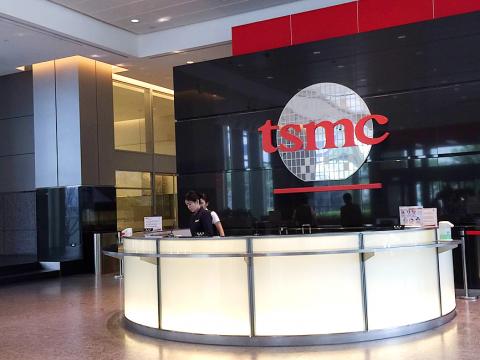Taiwan Semiconductor Manufacturing Co (TSMC, 台積電), which supplies microprocessors for Apple Inc’s iPhone 6S series, yesterday posted the strongest monthly revenue in nine months after iPhone 6S phones hit stores around the world in late September.
Revenue surged 26.7 percent to NT$81.74 billion (US$2.49 billion) last month, compared with NT$64.51 billion in September, according to a company statement.
Last month’s figure was the second highest in the chipmaker’s history after its revenue hit a record high in January.

Photo: Hung You-fang, Taipei Times
TSMC expects revenue this quarter to drop moderately by between 4 percent and 5.42 percent sequentially to a range between NT$201 billion and NT$204 billion, as customers continue to digest excess inventory.
In the first 10 months, revenue grew 16.2 percent to NT$721.72 billion, from NT$621.02 billion in the same period last year, TSMC said.
This year as a whole, TSMC sees revenue climbing 10 percent from last year, bucking the world semiconductor industry’s predicted zero percentage growth, TSMC chairman Morris Chang (張忠謀) said on Saturday last week.
TSMC made NT$762.81 billion last year.
Net profit is also set to expand at a 10 percent rate year-on-year, Chang said.
The firm’s board of directors yesterday approved capital expenditure of NT$125.36 billion for capacity expansion of advanced technology for packaging and assembly, construction of fabrication facilities and the transition of facility systems, the chipmaker said in a separate statement.
The budget also includes money for research and development and sustaining capital expenditure in the first quarter next year, the statement said.
Total capital expenditures this year is to be US$8 billion, down from a previous estimate of up to US$11 billion, given softer demand.
Local rival United Microelectronics Corp (UMC, 聯電) posted 15.63 percent sequential growth in revenue last moth at NT$12.06 billion, up from NT$10.43 billion.
On an annual basis, revenue shrank 10.65 percent from NT$13.5 billion.
In the first 10 months, UMC’s revenue increased 5.82 percent to NT$123.04 billion from NT$116.27 billion in the same period last year.

SEEKING CLARITY: Washington should not adopt measures that create uncertainties for ‘existing semiconductor investments,’ TSMC said referring to its US$165 billion in the US Taiwan Semiconductor Manufacturing Co (TSMC, 台積電) told the US that any future tariffs on Taiwanese semiconductors could reduce demand for chips and derail its pledge to increase its investment in Arizona. “New import restrictions could jeopardize current US leadership in the competitive technology industry and create uncertainties for many committed semiconductor capital projects in the US, including TSMC Arizona’s significant investment plan in Phoenix,” the chipmaker wrote in a letter to the US Department of Commerce. TSMC issued the warning in response to a solicitation for comments by the department on a possible tariff on semiconductor imports by US President Donald Trump’s

The government has launched a three-pronged strategy to attract local and international talent, aiming to position Taiwan as a new global hub following Nvidia Corp’s announcement that it has chosen Taipei as the site of its Taiwan headquarters. Nvidia cofounder and CEO Jensen Huang (黃仁勳) on Monday last week announced during his keynote speech at the Computex trade show in Taipei that the Nvidia Constellation, the company’s planned Taiwan headquarters, would be located in the Beitou-Shilin Technology Park (北投士林科技園區) in Taipei. Huang’s decision to establish a base in Taiwan is “primarily due to Taiwan’s talent pool and its strength in the semiconductor

An earnings report from semiconductor giant and artificial intelligence (AI) bellwether Nvidia Corp takes center stage for Wall Street this week, as stocks hit a speed bump of worries over US federal deficits driving up Treasury yields. US equities pulled back last week after a torrid rally, as investors turned their attention to tax and spending legislation poised to swell the US government’s US$36 trillion in debt. Long-dated US Treasury yields rose amid the fiscal worries, with the 30-year yield topping 5 percent and hitting its highest level since late 2023. Stocks were dealt another blow on Friday when US President Donald

UNCERTAINTY: Investors remain worried that trade negotiations with Washington could go poorly, given Trump’s inconsistency on tariffs in his second term, experts said The consumer confidence index this month fell for a ninth consecutive month to its lowest level in 13 months, as global trade uncertainties and tariff risks cloud Taiwan’s economic outlook, a survey released yesterday by National Central University found. The biggest decline came from the timing for stock investments, which plunged 11.82 points to 26.82, underscoring bleak investor confidence, it said. “Although the TAIEX reclaimed the 21,000-point mark after the US and China agreed to bury the hatchet for 90 days, investors remain worried that the situation would turn sour later,” said Dachrahn Wu (吳大任), director of the university’s Research Center for